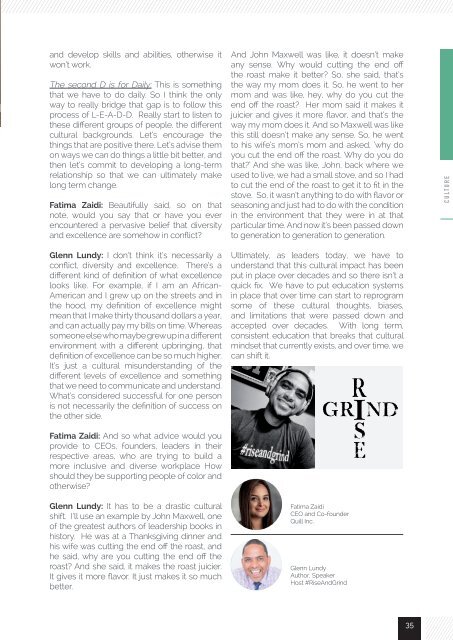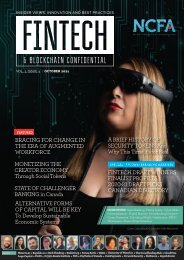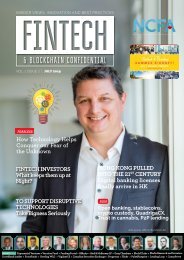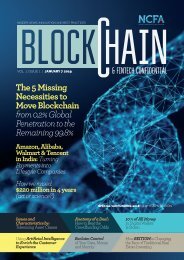NCFA Fintech Confidential December 2020 (Issue 3)
The National Crowdfunding & Fintech Association of Canada (NCFA) and partners are excited to present Vol. 1 Issue 3, FINTECH CONFIDENTIAL, a digital pop-up of the 6th annual 2020 Fintech & Financing Conference and Expo (FFCON20) held virtually across themed 8 weeks from July 9 to August 27 and co-hosted by NCFA and Toronto Finance International. The main theme of FFCON20 was “RISE”, reflecting the joint efforts of the two associations, NCFA and TFI, to build and increase the success and sustainability of Canada’s fintech and financial sector. There were many moving parts this year and a brand-new digital format with the event bringing together 100+ thought leaders, 50+ partners, and more than 500 attendees, 2 challenges and the inaugural Fintech Draft pitching and demo competitions. Congratulations to the winners: SolidBlock and MazumaGo (formerly DivDot)! Thanks to all the partners, speakers, attendees, volunteers and the entire organizing team for making FFCON20 an impactful and amazing online experience for Canada’s fintech and funding community. We hope you enjoy this issue of Fintech Confidential magazine – it certainly makes for great holiday reading! While everyone relentlessly strives to achieve success in 2021, we encourage you to bring in the new year with good health and to be mindful that we are all in this together, and to help others in your community more than ever before. Peace, happiness, and best wishes for an incredible year and journey ahead.
The National Crowdfunding & Fintech Association of Canada (NCFA) and partners are excited
to present Vol. 1 Issue 3, FINTECH CONFIDENTIAL, a digital pop-up of the 6th annual 2020 Fintech & Financing Conference and Expo (FFCON20) held virtually across themed 8 weeks from July 9 to August 27 and co-hosted by NCFA and Toronto Finance International.
The main theme of FFCON20 was “RISE”, reflecting the joint efforts of the two associations, NCFA and TFI, to build and increase the success and sustainability of Canada’s fintech and financial sector. There were many moving parts this year and a brand-new digital format with the event bringing together 100+ thought leaders, 50+ partners, and more than 500 attendees, 2 challenges and the inaugural Fintech Draft pitching and demo competitions. Congratulations to the winners: SolidBlock and MazumaGo (formerly DivDot)! Thanks to all the partners, speakers, attendees, volunteers and the entire organizing team for making FFCON20 an impactful and amazing online experience for Canada’s fintech and funding community.
We hope you enjoy this issue of Fintech Confidential magazine – it certainly makes for great holiday reading! While everyone relentlessly strives to achieve success in 2021, we encourage you to bring in the new year with good health and to be mindful that we are all in this together, and to help others in your community more than ever before. Peace, happiness, and best wishes for an incredible year and journey ahead.
You also want an ePaper? Increase the reach of your titles
YUMPU automatically turns print PDFs into web optimized ePapers that Google loves.
and develop skills and abilities, otherwise it<br />
won’t work.<br />
The second D is for Daily: This is something<br />
that we have to do daily. So I think the only<br />
way to really bridge that gap is to follow this<br />
process of L-E-A-D-D. Really start to listen to<br />
these different groups of people, the different<br />
cultural backgrounds. Let’s encourage the<br />
things that are positive there. Let’s advise them<br />
on ways we can do things a little bit better, and<br />
then let’s commit to developing a long-term<br />
relationship so that we can ultimately make<br />
long term change.<br />
Fatima Zaidi: Beautifully said, so on that<br />
note, would you say that or have you ever<br />
encountered a pervasive belief that diversity<br />
and excellence are somehow in conflict?<br />
And John Maxwell was like, it doesn’t make<br />
any sense. Why would cutting the end off<br />
the roast make it better? So, she said, that’s<br />
the way my mom does it. So, he went to her<br />
mom and was like, hey, why do you cut the<br />
end off the roast? Her mom said it makes it<br />
juicier and gives it more flavor, and that’s the<br />
way my mom does it. And so Maxwell was like<br />
this still doesn’t make any sense. So, he went<br />
to his wife’s mom’s mom and asked, ‘why do<br />
you cut the end off the roast. Why do you do<br />
that?’ And she was like, John, back where we<br />
used to live, we had a small stove, and so I had<br />
to cut the end of the roast to get it to fit in the<br />
stove. So, it wasn’t anything to do with flavor or<br />
seasoning and just had to do with the condition<br />
in the environment that they were in at that<br />
particular time. And now it’s been passed down<br />
to generation to generation to generation.<br />
CULTURE<br />
Glenn Lundy: I don’t think it’s necessarily a<br />
conflict, diversity and excellence. There’s a<br />
different kind of definition of what excellence<br />
looks like. For example, if I am an African-<br />
American and I grew up on the streets and in<br />
the hood, my definition of excellence might<br />
mean that I make thirty thousand dollars a year,<br />
and can actually pay my bills on time. Whereas<br />
someone else who maybe grew up in a different<br />
environment with a different upbringing, that<br />
definition of excellence can be so much higher.<br />
It’s just a cultural misunderstanding of the<br />
different levels of excellence and something<br />
that we need to communicate and understand.<br />
What’s considered successful for one person<br />
is not necessarily the definition of success on<br />
the other side.<br />
Fatima Zaidi: And so what advice would you<br />
provide to CEOs, founders, leaders in their<br />
respective areas, who are trying to build a<br />
more inclusive and diverse workplace How<br />
should they be supporting people of color and<br />
otherwise?<br />
Glenn Lundy: It has to be a drastic cultural<br />
shift. I’ll use an example by John Maxwell, one<br />
of the greatest authors of leadership books in<br />
history. He was at a Thanksgiving dinner and<br />
his wife was cutting the end off the roast, and<br />
he said, why are you cutting the end off the<br />
roast? And she said, it makes the roast juicier.<br />
It gives it more flavor. It just makes it so much<br />
better.<br />
Ultimately, as leaders today, we have to<br />
understand that this cultural impact has been<br />
put in place over decades and so there isn’t a<br />
quick fix. We have to put education systems<br />
in place that over time can start to reprogram<br />
some of these cultural thoughts, biases,<br />
and limitations that were passed down and<br />
accepted over decades. With long term,<br />
consistent education that breaks that cultural<br />
mindset that currently exists, and over time, we<br />
can shift it.<br />
Fatima Zaidi<br />
CEO and Co-founder<br />
Quill Inc.<br />
Glenn Lundy<br />
Author, Speaker<br />
Host #RiseAndGrind<br />
35






